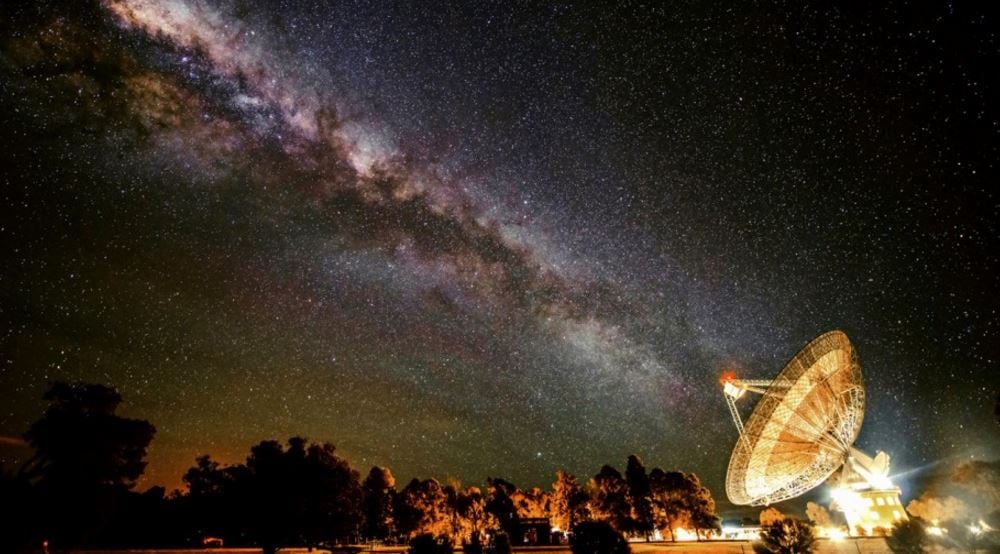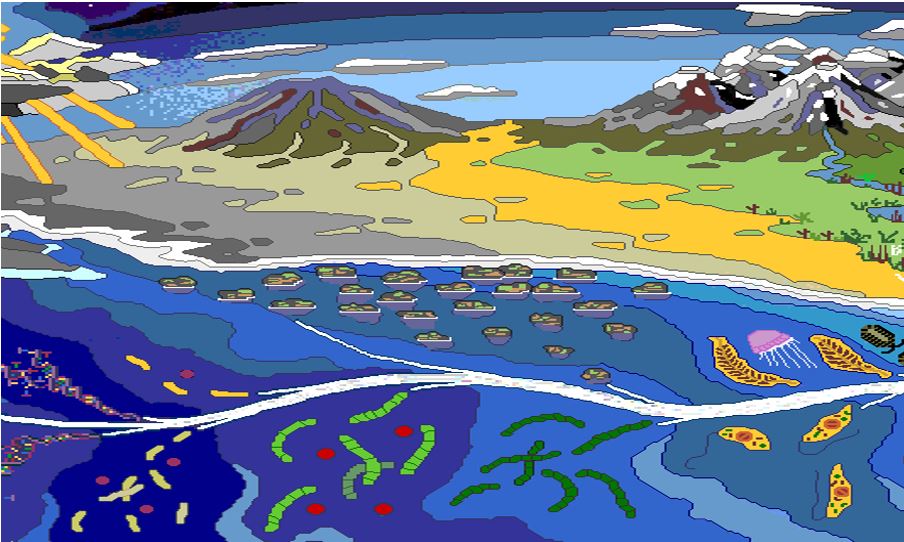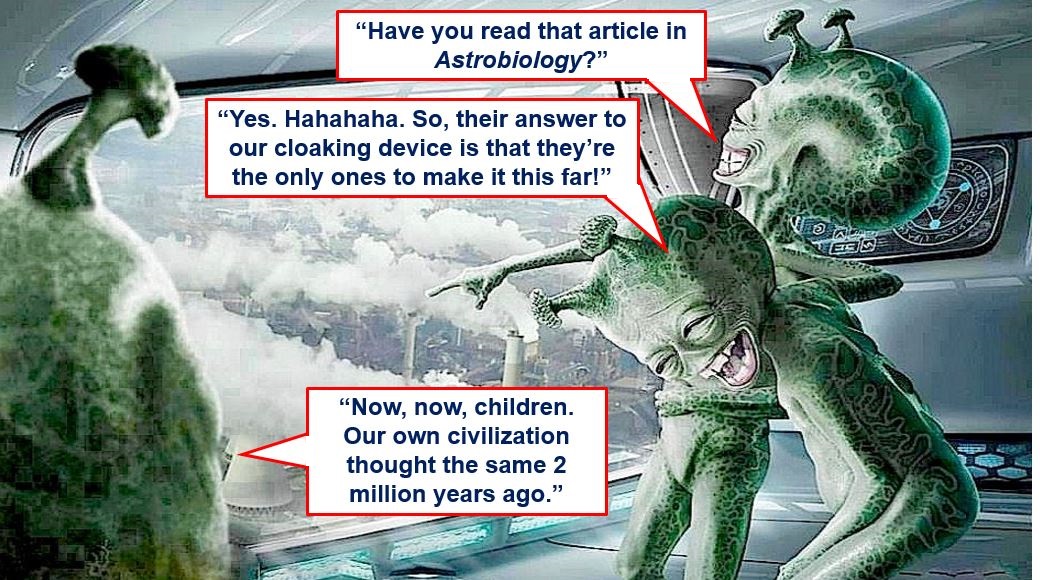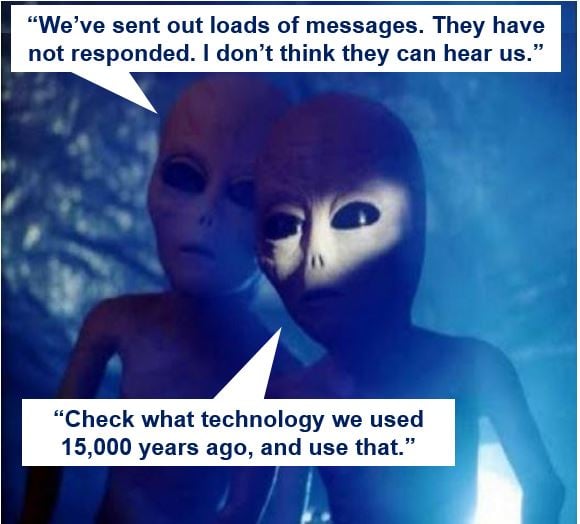Aliens once existed but they all died off, say astrobiologists from the Australian National University (ANU). There has been extraterrestrial life out there, we are not the only ones, but they became extinct, that is why the Universe is so silent, they say.
The scientists, from ANU’s Research School of Earth Sciences, wrote in the academic journal Astrobiology, that life in other worlds would likely be extremely brief and become extinct rapidly.
In a study, aimed at trying to understand how life might start and then evolve, lead author Dr. Aditya Chopra and colleagues found that any new life would typically die out due to extreme heat or cold on their fledgling planets.
 The CSIRO Parkes radio telescope scans space in the search for alien civilisations. (Image: anu.edu.au. Credit: Wayne England)
The CSIRO Parkes radio telescope scans space in the search for alien civilisations. (Image: anu.edu.au. Credit: Wayne England)
Dr. Chopra said:
“The universe is probably filled with habitable planets, so many scientists think it should be teeming with aliens. Early life is fragile, so we believe it rarely evolves quickly enough to survive.”
“Most early planetary environments are unstable. To produce a habitable planet, life forms need to regulate greenhouse gases such as water and carbon dioxide to keep surface temperatures stable.”
Mars and Venus might have had life once
Mars, Venus and Earth may all have been habitable – ideal for life as we know it – approximately four billion years ago. However, about one billion years after formation, Venus turned into a hothouse planet and Mars became an ultra-cold icebox.
If any primitive life forms started off in Mars and Venus, it failed to stabilize the rapidly changing environment, they added.
Co-author, Dr. Charles Lineweaver, Associate Professor at ANU’s College of Physical and Mathematical Sciences, said:
“Life on Earth probably played a leading role in stabilizing the planet’s climate.”
 The researchers believe that for life in the Universe, the biochemical evolution of single-celled microorganisms does not get the opportunity to evolve further because the environment becomes inhospitable. (Image: NASA Ames Research Center)
The researchers believe that for life in the Universe, the biochemical evolution of single-celled microorganisms does not get the opportunity to evolve further because the environment becomes inhospitable. (Image: NASA Ames Research Center)
The authors say their theory has solved a long-standing puzzle.
Dr. Chopra explained:
“The mystery of why we haven’t yet found signs of aliens may have less to do with the likelihood of the origin of life or intelligence and have more to do with the rarity of the rapid emergence of biological regulation of feedback cycles on planetary surfaces.”
The Fermi paradox
The Universe appears to have plenty of wet, rocky, planets with the energy sources and ingredients needed for life. However, as the Italian physicist who created the first nuclear reactor, Professor Enrico Fermi (1901-1954) said, no signs of surviving extra-terrestrial life have been detected.
Professor Fermi mused about what is today called the ‘Fermi paradox’: the contradiction between our presumed probability of the existence of extraterrestrial life and the fact that no contact has been made.
 If there are intelligent aliens nearby and they read the article, what would they think?
If there are intelligent aliens nearby and they read the article, what would they think?
A credible solution to the Fermi paradox, say the authors, is the near universal early extinction, which they call the Gaian Bottleneck.
Prof. Lineweaver said:
“One intriguing prediction of the Gaian Bottleneck model is that the vast majority of fossils in the universe will be from extinct microbial life, not from multicellular species such as dinosaurs or humanoids that take billions of years to evolve.”
In the Article, the authors wrote:
“After the early heavy bombardment, life emerges with some probability on initially wet rocky planets in the CHZ (circumstellar habitable zone).”
“However, due to large impacts and unstable abiotic volatile evolution with no tendency to maintain habitability, almost all life goes extinct early – with the rare exceptions of life that has undergone unusually rapid evolution and obtained some level of Gaian regulation.”
In astronomy and astrobiology, the circumstellar habitable zone is a region around a star where a rocky planet’s temperature would be suitable for liquid water, sunlight, and an atmosphere – where life as we know it could begin and evolve. It is also called the Goldilocks zone, because as in the children’s story, everything is ‘just right’.
 Could we be receiving messages, but don’t know how to detect them?
Could we be receiving messages, but don’t know how to detect them?
Prof. Stephen Hawking warns we may destroy ourselves
Prof. Stephen Hawking warned earlier this month that humans may become extinct because of something of their own making.
Unless we start colonizing other planets one day, the long-term future for humans does not look good. By long term, one presumes he is thinking thousands of years ahead.
During a talk he gave at this year’s BBC Reith Lectures, somebody from the audience asked him: “Do you think the world will end naturally or will man destroy it first?”
Prof. Hawking replied:
“We face a number of threats to our survival from nuclear war, catastrophic global warming, and genetically engineered viruses. The number is likely to increase in the future, with the development of new technologies, and new ways things can go wrong.”
“Although the chance of a disaster to planet Earth in a given year may be quite low, it adds up over time, and becomes a near certainty in the next thousand or 10,000 years. By that time, we should have spread out into space, and to other stars, so a disaster on Earth would not mean the end of the human race.”
“However, we will not establish self-sustaining colonies in space for at least the next hundred years, so we have to be very careful in this period.”
So, if we do manage to colonize other planets one day, and thus guarantee the continued survival of our race, couldn’t other civilizations out there have done the same?
Citation: “The Case for a Gaian Bottleneck: The Biology of Habitability,” Chopra Aditya and Lineweaver Charles H. Astrobiology. Astrobiology. January 2016, 16(1): 7-22. Doi:10.1089/ast.2015.1387.
Video – Aliens were out there, but now they are extinct
